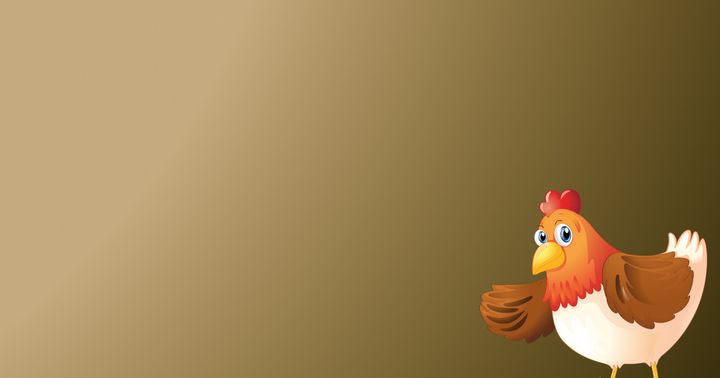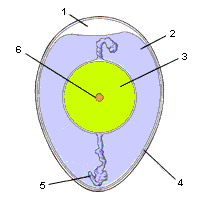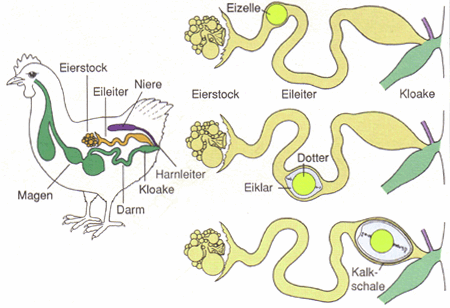From Egg To Chick: How Chicken Eggs Develop


The development of a chick starts not only when the egg is hatched, but already in the Fallopian tube of the hen.
More exactly, after the rooster gave his sperm to the hen.
The sperm of the rooster and the ovum of the hen merge. Then the nucleus inside the egg yolk serves the chicks as food as does the white of the egg.
After laying the egg the development of the chick stands still and will not be resumed until the egg gets hatched.

The course of the egg's production is as follows: The ovum gets out of the ovary and is transported through the Fallopian tube to the cloaca.
While it passes the Fallopian tube it is fertilized by the sperm of the rooster and afterwards several layers of the albumen wrap it.
Finally, a layer of calcium encloses the albumen.

That's a ready-made egg.
- Air chamber
- White of the egg
- Egg yolk
- Eggshell
- Chalaza
- Germinal disk
Now the egg is ready to get hatched.
| 1. Day | There are not any changes, yet. |
| 3. Day | On the egg yolk some blood vessels develop which provide the embryo with nutrients of the white of the egg and the egg yolk. |
| 5. Day | On the picture you can see 1 the germinal disk, which moves a little bit and 2 the air chamber. Besides that you can see the blood vessels, which look like threads. |
| 6. Day | The blood vessels are getting tighter and look like a cobweb on an X-ray image. |
| 12. Day | Within twelve days the embryo develops to look like a ready-made chick, but it only uses one half of the egg, so it will have to grow some more during the remaining nine days within the eggshell. Surprisingly, it is already able to hear. |
| 14. Day | On the X-ray image the egg looks dark now and you can only see the bright air chamber on the blunt side of the egg. On the picture you see 1 the fetal membrane which is supplied with blood, 2 the yolk, 3 the blood vessels running from the yolk to the embryo supplying it with nutrients and 4 the breathing membrane. |
| 17. Day | After the hatching period of 17 days the chick pierces through the egg membrane, and when its head and beak are in the air chamber it breathes with its lung. Now it perceives the voice of its mother and will remember it for the next few weeks. |
| 19. Day | The chicks start to communicate with each other and their mother. So actually they can control when to hatch out and they can delay it for over two hours until all chicks are ready to hatch out. Particularly for wild-living birds this is an advantage, because all the chicks get dry together and they can also leave the nest with their mother at same time. A short time before hatching out on the 19th or 20th day, the chick pulls the egg yolk through its navel into its stomach, and then the navel locks. So the egg yolk can be used as food for the next 24 hours and the chick does not need any food during these 24 hours. |
| 20. Day | Although the brood normally takes 21 days, most of the eggs are pecked on the 20th day. But actually "pecked on" is the wrong expression, because there is not enough room inside the egg to peck. Until a short time before hatching out, the chick's head lies on its breast. Then it lifts its head pressing a hole into the eggshell by means of a thorn located on the beak. By moving inside all the time the whole eggshell cracks and the chick presses against the eggshell. As it lifts the back of the neck it finally opens the lid. Important: The hen does not help the chick at all to get out of the eggshell. That's why you should not help your chicks either. As mentioned above, the egg yolk gets pulled inside just a short time before hatching out. Afterwards the navel closes. If you help your chicks it can happen, that the navel is not closed yet and you can see that it is bleeding. With bad luck bacteria get inside and threaten the young life of the chick. |
| 21. Day | Finally the chick hatches out today. |

